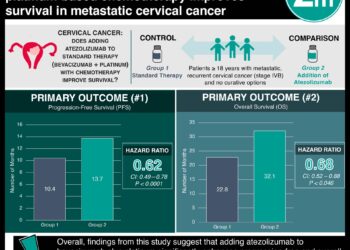Addition of bevacizumab fails to benefit overall survival in newly diagnosed glioblastoma [RTOG 0825 trial]
Image: PD
1. When added after initial treatment with temozolomide and radiotherapy, bevacizumab did not improve overall survival in newly diagnosed glioblastoma.
2. Although bevacizumab improved progression-free survival, it was associated with greater deterioration in neurocognitive function and symptom severity.
Evidence Rating Level: 1 (Excellent)
Study Rundown: Treatment with bevacizumab, an antibody against vascular endothelial growth factor A (VEGF-A), has produced dramatic responses on magnetic resonance imaging (MRI) in patients with recurrent glioblastoma. However, the clinical benefit of bevacizumab has been called into question; there is concern that imaging responses reflect vascular stabilization by bevacizumab rather than tumor regression. This study compared bevacizumab to placebo in patients receiving standard therapy (radiotherapy plus temozolomide) for newly diagnosed glioblastoma.
While bevacizumab did not improve overall survival compared to placebo, it did improve progression free survival. However, of patients deemed progression-free on imaging, patients receiving bevacizumab reported greater declines in perceived cognitive ability and also received worse scores on objective measures of neurocognitive function. Future studies and analyses are needed to clarify the relationship between improved progression free survival, as measured by imaging, and patients’ outcomes and wellbeing. Despite concerns about bevacizumab, it is important to carefully study any potentially beneficial therapies for this devastating disease with few available treatment options.
Click to read the study in the NEJM
Click to read an accompanying editorial in the NEJM
Relevant Reading: Bevacizumab plus Radiotherapy–Temozolomide for Newly Diagnosed Glioblastoma
In-Depth [randomized, double-blind, placebo-controlled trial]: In this study, 637 patients being treated for glioblastoma with radiotherapy and temozolomide were randomized to receive either bevacizumab or placebo beginning during week 4 of radiotherapy. At disease progression, treatment group was revealed; patients could then be initiated or continued on bevacizumab. Primary end points were duration of overall survival and progression-free survival. A substudy of subjects without tumor progression on imaging examined patient-reported outcomes (e.g. symptom severity) and neurocognitive functioning in the bevacizumab and placebo groups.
Median overall survival was 15.7 months in the bevacizumab group and 16.1 months in the placebo group (HR for death in bevacizumab group 1.13, 95% CI 0.93 to 1.37; p=0.21). Median progression free survival was 10.7 months in the bevacizumab group and 7.3 months in the placebo group (HR for progression or death 0.79, 95% CI 0.66 to 0.94, p=0.007). Among patients deemed progression-free, those in the bevacizumab group experienced greater reductions in scores of cognitive function and perceived greater deterioration in symptom severity than those in the control group. Several side effects were more common in the bevacizumab group than the placebo group; these include serious neutropenia and thrombocytopenia, hypertension, thromboembolic disease, visceral perforation, and serious hemorrhage.
©2012-2014 2minutemedicine.com. All rights reserved. No works may be reproduced without expressed written consent from 2minutemedicine.com. Disclaimer: We present factual information directly from peer reviewed medical journals. No post should be construed as medical advice and is not intended as such by the authors, editors, staff or by 2minutemedicine.com. PLEASE SEE A HEALTHCARE PROVIDER IN YOUR AREA IF YOU SEEK MEDICAL ADVICE OF ANY SORT.







